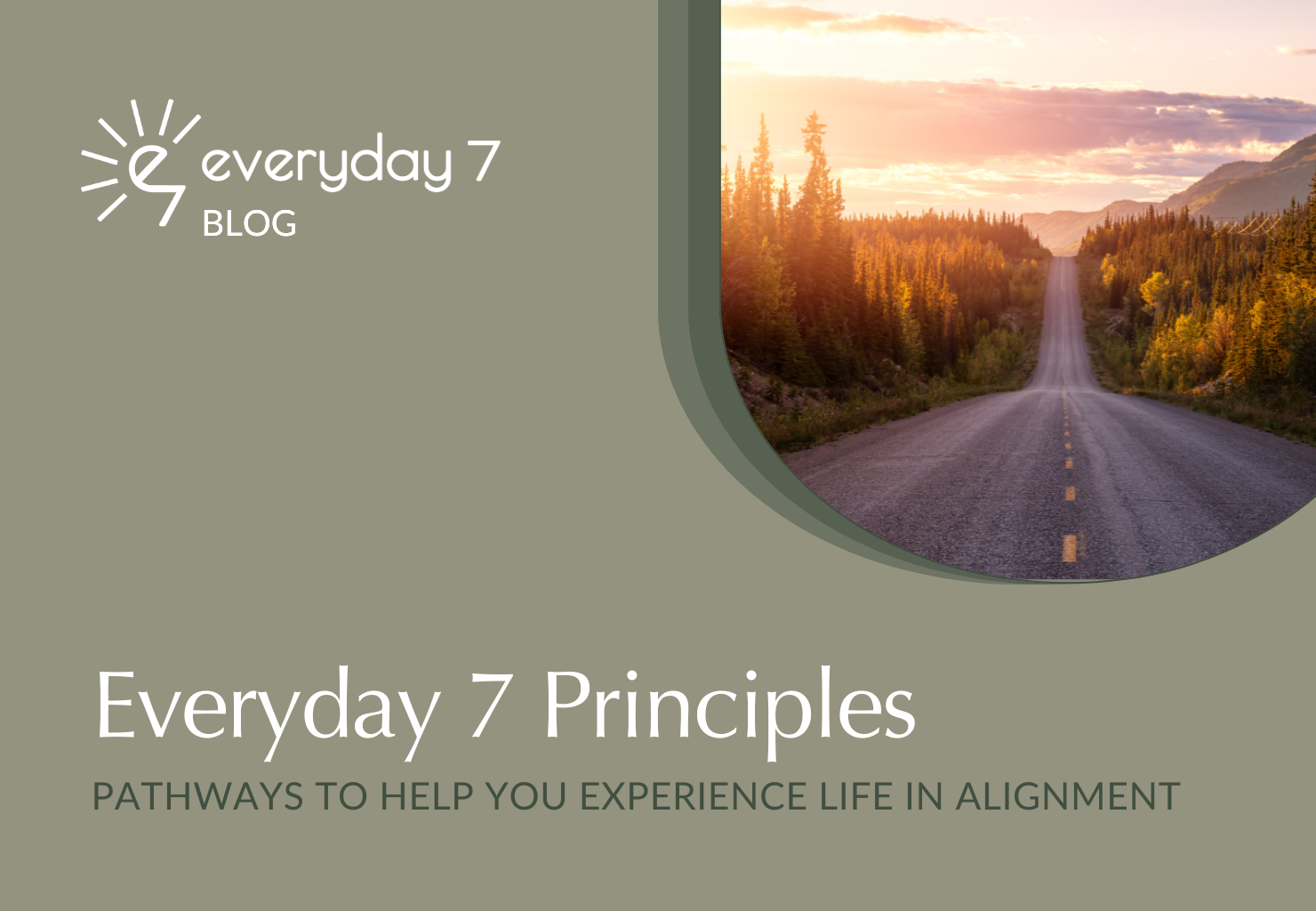The Everyday 7 Principles: Pathways to help you experience life in alignment
Explore the Everyday 7 Principles—a guide to living with intention, authenticity, resilience, and purpose. Learn how to cultivate self-awareness, well-being, and mindful engagement in a balanced, fulfilling life.

The Essence of It
Everyday 7 Principles provide a foundation for living authentically, growing with self-awareness, contributing meaningfully, maintaining well-being, building resilience, cultivating balanced relationships, and engaging mindfully with society. Below, we explore the deeper meaning behind each principle and how they shape a more aligned life, along with practical ways to embody them.
Core Insights
- Authenticity is about self-honesty, integrity, and living in alignment with your values.
- Growth requires an ongoing relationship with self-reflection and change.
- Purpose is found in how we show up in the world and share our unique gifts.
- Well-being extends beyond health into a holistic state of balance and vitality.
- Resilience is about embracing life's challenges with adaptability and strength.
- Relationships require harmony between self and others, balancing connection with autonomy.
- Mindful engagement means participating in society consciously, rather than passively accepting its pressures.
The Meaning Behind the E7 Principles
1. Authentic Living
Authenticity is the foundation of a meaningful life. It means living in alignment with who you truly are, rather than conforming to external expectations. Authenticity is not just about self-expression but also self-honesty—recognizing your true desires, fears, and motivations. When you live authentically, your actions, words, and inner world align, creating a sense of peace and clarity.
How to Practice:
- Identify your core values and revisit them regularly.
- Speak and act in ways that align with your true beliefs, even in small moments.
- Develop self-awareness around when and why you mask parts of yourself.
- Challenge limiting narratives that prevent you from fully expressing who you are.
2. Self-Awareness and Growth
Self-awareness is the key to personal evolution. It requires deep introspection and a willingness to examine one's thoughts, emotions, and patterns. Growth happens when we acknowledge our strengths and limitations without judgment, allowing us to navigate change with intention. This principle invites a lifelong journey of learning and unlearning, ensuring that we remain open to new insights and personal expansion.
How to Practice:
- Engage in daily reflection through journaling or quiet contemplation.
- Notice recurring patterns in your thoughts, behaviors, and relationships.
- Seek out experiences that challenge your current perspectives.
- Embrace constructive feedback as an opportunity for learning.
3. Purpose and Contribution
Purpose is not a singular mission but a way of moving through the world with intention. It is found in the ways we contribute—whether through creative expression, acts of service, or everyday interactions. This principle recognizes that every individual has a unique role to play and that fulfillment arises when we connect our gifts to something greater than ourselves. Purpose is not about grand achievements; it is about showing up meaningfully in both small and profound ways.
How to Practice:
- Reflect on what activities make you feel most engaged and fulfilled.
- Identify small ways you can contribute meaningfully in your daily life.
- Shift your focus from outcome-based success to process-based fulfillment.
- Explore new ways to express your skills, passions, and wisdom.
4. Health and Well-Being
True well-being goes beyond physical health—it is a dynamic state of balance that includes mental, emotional, and spiritual harmony. This principle emphasizes that self-care is not indulgence but necessity. Prioritizing well-being allows us to move through life with greater presence, energy, and resilience. It is about cultivating habits that nourish us holistically and recognizing that a thriving life begins with a strong foundation of self-care.
How to Practice:
- Develop daily rituals that nourish your body, mind, and emotions.
- Establish boundaries that protect your energy and mental health.
- Listen to your body’s signals and respond with kindness.
- Engage in movement, rest, and nourishment in ways that feel sustainable.
5. Resilience in Real Life
Resilience is the ability to remain grounded in the face of life’s uncertainties. It is not about avoiding struggle but about developing the inner resources to navigate it. This principle acknowledges that challenges are inevitable, yet they also serve as opportunities for growth. Resilience is built through adaptability, emotional regulation, and an ability to hold perspective even in difficult moments. It is a reminder that strength is not about avoiding hardship but about moving through it with grace.
How to Practice:
- Shift from a fixed mindset to a growth mindset—view challenges as teachers.
- Build a support system that helps you navigate adversity with perspective.
- Develop coping mechanisms that help you process stress effectively.
- Practice gratitude and re-framing during difficult situations.
6. Balanced Relationships
Relationships form the fabric of our lives, yet they require careful tending. Balance in relationships means maintaining connection without losing oneself. It involves mutual respect, open communication, and honoring boundaries. This principle reminds us that healthy relationships are not about dependency or avoidance, but about reciprocity—offering support while maintaining personal integrity.
How to Practice:
- Set and communicate clear boundaries with kindness and confidence.
- Listen with presence rather than preparing to respond.
- Recognize when relationships feel nourishing versus depleting.
- Cultivate relationships where mutual growth and respect are prioritized.
7. Mindful Engagement with Society
Mindful engagement recognizes that we do not exist in isolation. While society imposes structures and expectations, we have the power to engage with them consciously. This principle invites discernment—choosing what aligns with our values rather than blindly accepting external narratives. It encourages participation in community, activism, and social change in a way that honors both collective responsibility and personal authenticity.
How to Practice:
- Curate your digital and social environment intentionally.
- Question societal expectations and decide which align with your truth.
- Participate in causes or movements that resonate with your values.
- Engage in meaningful conversations that encourage awareness and action.
Guidance, not Doctrine
The Everyday 7 Principles offer a deeper understanding of what it means to live with intention. They are not rigid doctrines but guiding philosophies that encourage self-inquiry, presence, and meaningful action. By embodying these principles, we cultivate a life that is both deeply personal and interconnected with the world around us.




